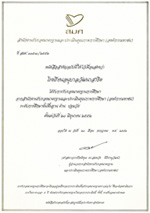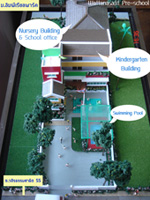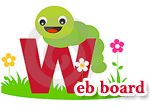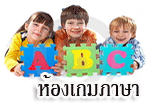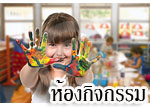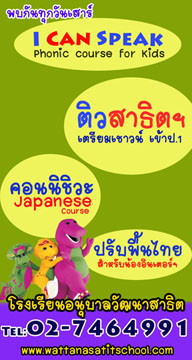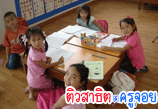
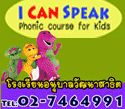
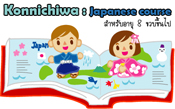

Wattanasatit Pre-School & Inter Kids : Kindergarten and Nursery
Phonics and whole language learning: a balanced approach to beginning reading
Children cannot learn to read without an understanding of phonics. All children must know their ABCs and the sounds that letters make in order to communicate verbally. The question in early childhood programs is not whether to teach "phonics" or "whole language learning," but how to teach phonics in context--rather than in isolation--so that children make connections between letters, sounds, and meaning.
Phonics should not be taught as a separate "subject" with emphasis on drills and rote memorization. The key is a balanced approach and attention to each childs individual needs. Many childrens understanding of phonics will arise from their interest, knowledge, and ideas. Others will benefit from more formal instruction. There are many opportunities to teach the sound a letter makes when children have reason to know. For example, the first letter a child learns typically is the first letter of her name.
Some teachers worry that encouraging children to learn through experience and invent their own spellings will not provide them with adequate language skills. But literacy is not so much a skill as a complex activity that involves reading, writing and oral language. Ideally, children should develop literacy through real life settings as they read together with parents or other caring adults. Children begin to make connections between printed words and their representations in the world.
Adults should keep in mind that children may learn to read at different paces during kindergarten and first grade. This is true for all children, including those with special needs and those from linguistically and culturally diverse backgrounds. If parents and teachers work together and demonstrate mutual respect, childrens learning will be reinforced at home and in the classroom.
Infants
- Talk, read, and sing to infants--they learn from everything they see and hear even in the first stages of life.
- Take your baby to the park, zoo, and the store with you. Bring her attention to objects, signs, and people.
- Always make books a part of your babys toy selection, even if he enjoys handling books more than being read to. As your child grows, point out pictures of objects and offer their names. Eventually, your child will be able to name the pictures, too.
- Encourage associations between symbols and their meaning--as they get closer to toddlerhood, children may begin to recognize familiar signs for products and logos for cereal or fast food restaurants.
Toddlers
- Help toddlers make the transition from baby talk to adult language by repeating their words and expressions correctly without reprimanding them.
- Let toddlers "read" their favorite picture books by themselves while you remain close by to comment. Or, pause before a familiar word as you read to your toddler, and let her fill in the missing word. This works especially well with rhymes or repeated refrains.
- Provide magnetic and block letters to introduce a toddler to the spelling of his name.
- Before you take your toddler on a new type of outing, read about the events you are about to witness. Talk with your child about the experience, and follow up with further reading to reinforce learning.
Preschooler
- Add new books to your childs collection, but keep reading old favorites. Your preschooler may know them by heart now--this represents an important step in learning about reading.
- Continue to take children shopping with you, and let them help identify products with coupons. Let preschool children join in as you follow a recipe.
- Take books on long trips with you to encourage reading as entertainment.
School-age children
- Continue to read to your child, even if she has learned to read already. Take turns reading pages of your favorite books.
- Encourage story writing by listening to the stories children tell.
- Play word games like Scrabble or Boggle with children and introduce them to crossword puzzles.
Additional resources:
Chapman, M.L. 1996. The development of phonemic awareness in young children: Some insights from a case study of a first-grade writers. Young Children 51 (2). Washington, DC: NAEYC.
Schickedanz, J.A. 1986. More than the ABCs: The early stages of reading and writing. Washington, DC: NAEYC #204/$6.
NAEYC. 1998. Raising a Reader, Raising a Writer: How Parents Can Help. Washington, DC: NAEYC #530. For a free copy of this brochure, send SASE to NAEYC, Box 530, 1509 16th St., NW, Washington, DC 20036-1426.






